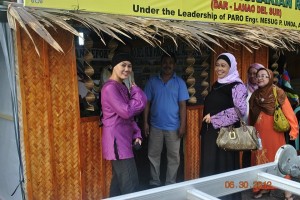Election tourism, anyone?
MANILA, Philippines—Eco-tourism or medical tourism may be common catch-phrases that our government has been using in the past decade to encourage more local and foreign visitors to the islands but no one has heard of “election tourism.”
In an interview with anchors Susan K and Captain Dylan Halili early Tuesday on Radyo Inquirer, Lanao del Sur Assemblywoman Samira Gutoc-Tomawis of the Autonomous Region in Muslim Mindanao (ARMM) defined it as the practice of politicians shouldering transportation expenses to potential voters working in Metro Manila and other far-flung cities.

Lanao del Sur Assemblywoman Samira Gutoc-Tomawis sharing stories with her constituents. Facebook page photo.
“We call it election tourism when politicians pay for people’s (bus-ship-plane) tickets plus allowance. Kaya masarap pong bumoto ngayon. So even before they go here at the ARMM to vote, even if they don’t know the names of candidates, their votes have been influenced already,” said Gutoc-Tomawis, a former journalist-writer who is on her first term as assemblywoman in Lanao del Sur.
Though this practice happens only during elections, she said the cheating process starts during the voters’ registration period.
She said this is happening even before the start of the 10-day voting registration at the ARMM, which started Tuesday. She said ‘hakot’ system still takes place, or the hauling or ferrying of voters from other districts or towns to register in a separate precinct.
She said there were jeepneys and buses from the cities of Davao and Iligan carrying people whose faces aren’t familiar to the locals. She told Radyo Inquirer there were 300 people from Maguindanao who tried to enter the Marawi City hall. Marawi City is the capital of Lanao del Sur.
Then again, she said she’s thankful for the presence of soldiers and policemen, numbering to about 2,000, who stay on guard against flying voters.
“This time, instead of teachers, we have authorities from the Philippine Army and the Philippine National Police who are on the frontline in keeping peace and order,” she said.
“I am thankful and proud to say there are still brave soldiers managing the elections to. I hope this continues,” she added.
For decades since its creation, the ARMM—composed of five provinces namely Lanao del Sur, Maguindanao, Sulu, Tawi-Tawi and Basilan—has been the most vulnerable to election fraud, earning the label “cheating capital of the Philippines.”
Last year, President Benigno Aquino III through Republic Act 10153 called on the postponement of the ARMM elections originally scheduled on August 8, 2011 to May 11, 2013, a decision upheld by the Supreme Court as constitutional.
Besides appointing officers-in-charge at the ARMM, the aim was to cleanse their lists of flying voters.
Gutoc-Tomawis said based on the record at the National Statistics Office, the voting population of ARMM is less than 1.7 million.
“It could be around one million only, kokonti lang po talaga ang tao sa ARMM,” she said.
For the full interview listen to the attached audio clip from Radyo Inquirer 990AM.














